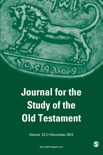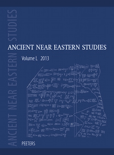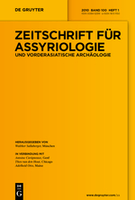
Aula Orientalis
Scope & Guideline
Bridging Disciplines in Near Eastern Studies
Introduction
Aims and Scopes
- Interdisciplinary Research:
The journal promotes research that crosses traditional academic boundaries, integrating archaeology, history, linguistics, and cultural studies to provide a holistic understanding of ancient societies. - Focus on Ancient Near Eastern Civilizations:
Aula Orientalis primarily explores the history, literature, and archaeology of ancient civilizations such as Mesopotamia, Egypt, and their surrounding regions, aiming to illuminate their cultural and historical significance. - Philological and Linguistic Studies:
The journal publishes works that delve into the languages and texts of ancient civilizations, offering insights into their linguistic structures, literary forms, and historical context. - Archaeological Findings and Interpretations:
A significant portion of the journal's content is dedicated to new archaeological discoveries and their interpretations, contributing to the ongoing dialogue about ancient life and culture. - Cultural and Historical Contextualization:
The journal emphasizes the importance of understanding ancient texts and artifacts within their broader cultural and historical contexts, fostering a deeper appreciation of their significance.
Trending and Emerging
- Gender Studies in Ancient Cultures:
There is a growing trend towards exploring gender roles and representations in ancient societies, as seen in works that analyze gender dynamics in literature, rituals, and social practices. - Interdisciplinary Approaches to Archaeology:
Recent papers emphasize the integration of various disciplines, such as anthropology, sociology, and digital humanities, into archaeological studies, leading to more comprehensive interpretations of ancient artifacts and sites. - Cultural Reception and Influence:
Research focusing on how ancient cultures influenced each other and how their legacies are perceived in modern contexts is gaining traction, particularly in studies examining the reception of ancient texts and figures in contemporary literature and art. - Environmental Archaeology:
The exploration of environmental factors and their impact on ancient civilizations is on the rise, with scholars investigating how climate, geography, and ecology influenced cultural developments and societal changes. - Digital Humanities and Ancient Studies:
There is an increasing interest in utilizing digital tools and methodologies to analyze ancient texts and artifacts, enhancing accessibility and allowing for innovative forms of scholarship and collaboration.
Declining or Waning
- Traditional Textual Analysis:
There has been a noticeable decrease in purely traditional textual analysis without contextual frameworks. Scholars seem to be moving towards more interdisciplinary approaches that incorporate archaeological and sociocultural insights. - Comparative Mythology:
Interest in comparative mythology, particularly in the context of ancient Near Eastern religions, appears to be waning. This shift may suggest a preference for more nuanced studies that focus on specific cultural practices rather than broad comparisons. - Ancient Economic Systems:
Research focusing solely on the economic systems of ancient civilizations has diminished. Instead, there is a trend towards integrating economic studies with social and political contexts, reflecting a broader understanding of ancient societies. - Historicism in Literary Studies:
The focus on historicism in literary studies, which emphasized the historical context of literary works, has declined. Scholars are increasingly interested in theoretical frameworks that offer different lenses through which to analyze ancient texts.
Similar Journals

Journal for the Study of the Old Testament
Connecting Theology with Historical ContextJournal for the Study of the Old Testament, published by SAGE PUBLICATIONS LTD, is a preeminent peer-reviewed journal dedicated to advancing the field of religious studies, particularly the scholarly investigation of the Old Testament. With its ISSN of 0309-0892 and E-ISSN 1476-6728, the journal has been a vital resource for researchers since its inception in 1976 and continues to deliver cutting-edge scholarship through 2024. Renowned for its rigorous academic standards, the journal has achieved a prestigious Q1 ranking in Religious Studies, positioning it among the top quartile of academic journals in this field. It holds a commendable 75th percentile ranking in the Scopus database, highlighting its impact and relevance in contemporary discourse. Addressed from its United Kingdom base at 1 Olivers Yard, 55 City Road, London EC1Y 1SP, the journal features a comprehensive exploration of theological themes, literary analyses, and historical contexts, aimed at researchers, professionals, and students alike. While access options may vary, the journal remains an indispensable platform for fostering scholarly dialogue and disseminating innovative ideas within the discipline.

Bulletin of the American Society of Overseas Research
Bridging gaps in knowledge with innovative research and discourse.Bulletin of the American Society of Overseas Research, published by the University of Chicago Press, serves as a premier platform for scholarly discourse in the fields of archaeology, cultural studies, and history. With its ISSN 2769-3600 and E-ISSN 2769-3589, this journal has swiftly established itself as a key resource for researchers, professionals, and students alike, demonstrating exceptional impact as evidenced by its Q1 rankings in multiple relevant categories for 2023. Notably, it holds the 93rd percentile rank in Arts and Humanities (History) and the 84th percentile in Social Sciences (Cultural Studies), evidencing its respected standing within the academic community. The journal's commitment to advancing knowledge and fostering interdisciplinary dialogue is complemented by its accessible publication from 2022 to 2024, making it an essential read for those engaged in the exploration of global cultural histories and archaeological research.

Adalya
Preserving History, One Article at a TimeAdalya, published by the esteemed Koc University Suna & Inan Kirac Research Center for Mediterranean Civilizations (AKMED), is a prominent academic journal dedicated to the fields of Archeology, History, and Conservation. With an ISSN of 1301-2746, this journal serves as an essential platform for scholars and researchers, fostering insightful discussions and disseminating significant findings about Mediterranean civilizations. Recognized in the quartile rankings of Q3 in Archeology and Q2 in both Conservation and History for the year 2023, Adalya reflects an impactful presence in its respective disciplines. Although it operates under a traditional subscription model, the journal remains accessible to a diverse audience interested in the nuanced exploration of historical contexts and conservation practices. Located in Antalya, Turkey, the journal has carved out a niche since its inception in 2009, bridging the past and present through rigorous academic inquiry. Whether you are a seasoned researcher or a student eager to deepen your understanding of Mediterranean cultures, Adalya offers invaluable resources and perspectives that enrich the academic community.

Ancient Near Eastern Studies
Exploring Interdisciplinary Insights into Ancient CivilizationsAncient Near Eastern Studies, published by PEETERS in Belgium, is a distinguished journal dedicated to the exploration and scholarship of the rich cultural and historical tapestry of the ancient Near East. With a focus on interdisciplinary research, this journal invites contributions across various fields including Archeology, History, Classics, Literature and Literary Theory, and Visual Arts and Performing Arts. As evidenced by its robust performance in the 2023 category quartiles, ranking Q1 in Classics and Q2 in History, this journal is recognized for its academic rigor and relevance, making it an integral platform for researchers, professionals, and students alike. Although currently not open access, it provides indispensable insights into research trends and theoretical frameworks that advance our understanding of ancient civilizations. With its ISSN 1378-4641 and E-ISSN 1783-1326, Ancient Near Eastern Studies continues to foster scholarly communication and engagement in this vital area of human history.

Rivista Storica Dell Antichita
Pioneering Research in Archaeology and ClassicsRivista Storica Dell Antichita is a distinguished academic journal published by PATRON EDITORE S R L, dedicated to advancing knowledge in the fields of Archaeology, Classics, and History. With an ISSN of 0300-340X, this journal serves as a crucial platform for scholars and researchers who seek to delve into the rich historical narratives of antiquity. Although it has discontinued its coverage in Scopus after 2021, its legacy reflects a commitment to fostering scholarly dialogue within the academic community, evident from its rankings in notable Scopus categories, including Q3 in Classics and Q4 in Archaeology and History. Additionally, Rivista Storica Dell Antichita boasts a substantial readership in Italy, contributing to the understanding of historical contexts and methodologies. As scholars engage with its authentic research articles, they will find in this journal a valuable resource that not only enhances academic discourse but also inspires future explorations into the ancient world.

Zeitschrift fur Assyriologie und Vorderasiatische Archaologie
Bridging Time: Where Ancient Civilizations Meet Modern ScholarshipZeitschrift für Assyriologie und Vorderasiatische Archäologie, published by WALTER DE GRUYTER GMBH, is a distinguished journal in the field of archaeology, focusing on the rich histories of the ancient Near East and Assyrian studies. Established in 1886, this journal has a venerable tradition of contributing to scholarly discourse, continuously curating impactful research that positions it within the Q2 quartile in the domains of Archaeology and Arts and Humanities as of 2023. With an impressive ranking of #101 out of 413 in Arts and Humanities and #98 out of 354 in Social Sciences within Scopus, the journal serves as a vital resource for researchers, professionals, and students alike. Although it operates under a subscription model, the journal's extensive coverage—from its inception to the present day—ensures a comprehensive exploration of archaeological methodologies, discoveries, and theoretical frameworks. The journal's aim is to advance the understanding of the ancient civilizations of the Near East and to foster scholarly communication across international platforms, making it an essential venue for contemporary archaeological research.

ZEITSCHRIFT DES DEUTSCHEN PALASTINA-VEREINS
Illuminating the Past to Inform the PresentZEITSCHRIFT DES DEUTSCHEN PALASTINA-VEREINS is a distinguished academic journal published by VERLAG OTTO HARRASSOWITZ, focusing on interdisciplinary research in archaeology, cultural studies, history, and religious studies. With an ISSN of 0012-1169, this periodical has gained recognition for its valuable contributions to the understanding of historical and contemporary issues related to the Levant region, making it an essential resource for researchers, professionals, and students fascinated by these disciplines. The journal's performance in the academic community is bolstered by its Q2 and Q3 quartile rankings across various subject categories in 2023, including significant placements in cultural studies and religious studies, reflecting its impact and relevance. ZEITSCHRIFT DES DEUTSCHEN PALASTINA-VEREINS not only serves as a platform for scholarly discourse but also engages with current debates and methodologies, fostering a deeper appreciation for the complexities of Palestinian studies and contributing to a vibrant academic landscape. While the journal is not open access, it remains a critical venue for disseminating cutting-edge research and perspectives.

Journal of Hebrew Scriptures
Exploring the Depths of Hebrew ScripturesThe Journal of Hebrew Scriptures is a leading open-access academic journal, published by University of Alberta, that has been at the forefront of biblical scholarship and Jewish studies since its inception in 1997. This journal presents an extensive collection of scholarly articles, critical analyses, and discussions that focus on the interpretation and significance of Hebrew Scriptures, making it an essential resource for researchers, educators, and students alike. The journal's commitment to open access ensures that it reaches a wide audience, promoting greater visibility and collaboration within the field. With its dedication to advancing the study of biblical texts, the Journal of Hebrew Scriptures plays a pivotal role in fostering academic discourse and disseminating innovative research to the global scholarly community. As an invaluable platform for the exploration of theological, historical, and cultural aspects of Hebrew Scriptures, it invites submissions that can enrich the understanding and appreciation of these ancient texts.

BULLETIN OF THE AMERICAN SOCIETY OF PAPYROLOGISTS
Decoding the Past, One Manuscript at a TimeThe Bulletin of the American Society of Papyrologists is an esteemed journal dedicated to advancing the field of papyrology and related studies in archaeology and history. Published by Peeters, this journal offers a rich array of scholarly articles that delve into the analysis and interpretation of ancient manuscripts and inscriptions, shedding light on historical contexts and cultural nuances. Its impressive impact factor places it in the Q1 category for history and Q2 for archaeology in the 2023 rankings, affirming its significance within the academic community. Though not an open-access publication, the journal remains accessible to researchers and institutions, fostering a collaborative environment for sharing discoveries and scholarly dialogue. With its publication history dating back to 2002, the Bulletin continues to be an essential resource for scholars, historians, and students interested in the complexities of ancient texts and civilizations.

Eirene-Studia Graeca et Latina
Connecting Past and Present through ResearchEirene-Studia Graeca et Latina, ISSN 0046-1628, is a prominent academic journal published by the Institute of Classical Studies, Academy of Sciences of the Czech Republic. Focusing on the fields of Classics, Linguistics, and Archaeology, this journal serves as a vital platform for scholarly discourse and research dissemination since its inception in 2002. Although it operates under a traditional access model, the journal has established itself within the academic community, evidenced by its placement in the Q4 category across multiple disciplines in 2023. This includes significant rankings in areas such as Archaeology and Language and Linguistics, where it finds itself within the 27th to 16th percentiles of its respective categories. Eirene aims to foster the advancement of research in the Humanities, providing a rigorous forum for scholars and practitioners interested in classical studies. Its contribution to the academic landscape is essential for those who aspire to explore the depths of ancient languages, cultures, and methodologies, making it a valuable resource for researchers, professionals, and students alike.